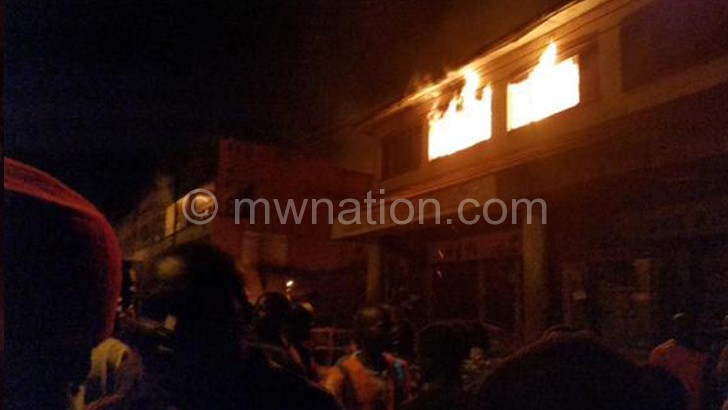Mystery as fire guts Mzuzu Central Market again
Questions surround the cause of massive fire which gutted Mzuzu Main Market on Wednesday night, destroying hundreds of stores and nearby high-risk buildings.
The inferno, the third of its kind since April last year, started around 7.30pm with some streetside vendors still selling their merchandise at the heart of the city.
Some rice vendors, who ply their trade at the car park of the central market, told Nation Online they were cashing in on city dwellers shopping for Mother’s Day today until fire suddenly exploded into view.
“We heard something like an explosion. Boom! Suddenly, the market was on fire,” said one of the eye-witnesses.
The fire reportedly began in a store made of residual timber before spreading to multimillion-kwacha goods in surrounding shops that cram the fire-prone market adjacent two relatively tall buildings that were equally hit.
The gutted side directly overlooks a vast area where brick-and-mortar shops have been emerging from a fire which destroyed the market on July 14, leaving goods worth about K283 million ($514,545) up in smoke.
The fire, which smoked people out of their homes during the finals of the Football World Cup finals, came two months following another fire that raze down goods estimated at K110 million ($200,000).
On Wednesday, Mzuzu Mayor William Mkandawire said it was shocking that a nocturnal fire had hit the market the third time since last year.
“It’s hard, very hard,” said Mkandawire. “It’s hard to figure out what the traders, who are still rising from the ashes of last year’s fires, will survive and rebuild their business. For the council, it’s shocking continue to experience so many night fires. What wrong have we done?”
The mayor was speaking in the smoky glow of the market fire affecting upper floors of two multi-stringed buildings that house traders of Asian origin.
The foreign traders came out in large numbers to support each other. Malawians looked on as firefighters struggled to put out the raging flames.
As the fireballs leapt from one shop to another on the top storeys, some of the businessmen on the ground floors were busy emptying their merchandise into vans.
In the rush to salvage the goods for sale, other traders from India, Pakistan and China left their shops locked, watching as their fortune went up in smoke with looters prowling the scene.
So massive were the scenes of looting at the onset of the fiery fire and some young men were seen grabbing goods from some businesswomen whom they had pushed to the ground in a race to save vestiges of her cosmetics shop.
The free-for-all scenes were buoyed by the police failure to have the disaster zone cordoned off for relief and security purposes.
Tens of thousands of onlookers blocked the streets, denying fire engines a right of passage and repeatedly throwing object at the rescue team which they accused of a delayed and uncoordinated fire-fighting strategy.
The chaotic scenes waned around 9pm when a pick-up carrying Malawi Defence Forces arrived to beef up security. The armed forces marched all over the scene, sending shivers into the crowd.
The police were spotted making some arrests, but both the security agency’s spokespersons were not immediately available for comment when asked for figures.
“It’s a disturbing spectacle because some of those affected, especially those who sell fish and salt, are widows and breadwinners of households in untold poverty. However, we thank the fire-fighters and security agents for a timely intervention,” said Mzuzu City legislator Charles Njikho.
However, the vendors and eye witnesses faulted the fire brigade, comprising three fire engines, for coming late, taking long everytime they sped away to replenish water and prioritising a devastated building at the expense of another which had just caught the fire.
Actually, the accident exposed a double tragedy.
First, the long waits for fire engines’ return confirmed there are no emergency water points in the central market with about 3 000 people and the rescue team relied on hydrants at the seat of government in the city.
Second, the seemingly unrelenting inferno escalated to catastrophic levels as ferocious flames fuelled by exploding cooking oil bottles morphed into fireballs, illuminating the disastrous effects of illegal warehouses mushrooming in most buildings as the Asian community keep turning central business district of the country’s cities into residential zones.
The silent change of land use, which Mayor Mkandawire warned against recently, also left the crowd panicking as they couldn’t enumerate whether all occupants had vacated the upper floors which were the worst hit.
Such wad the fire that just when many victims were counting their losses in tears, a weeping woman collapsed at the sight of the magnitude of the loss.
“We are dead. How are we going to feed our families? How are we going to repay the loans? How? Why always us in Mzuzu?” cried a man who had lost his electronic business adjacent to the burnt buildings.
The catastrophe comes as the city council is yet to come clear on similar tragedies at Vigwagwa Market in the vicinity last month.
The country has been engulfed with fire – related disasters— including the burning of Vigwagwa Market, a village in Neno, Chilomoni People’s Supermarket, Mkanda Post Office in Mchinji and Dedza Market—since last month.







